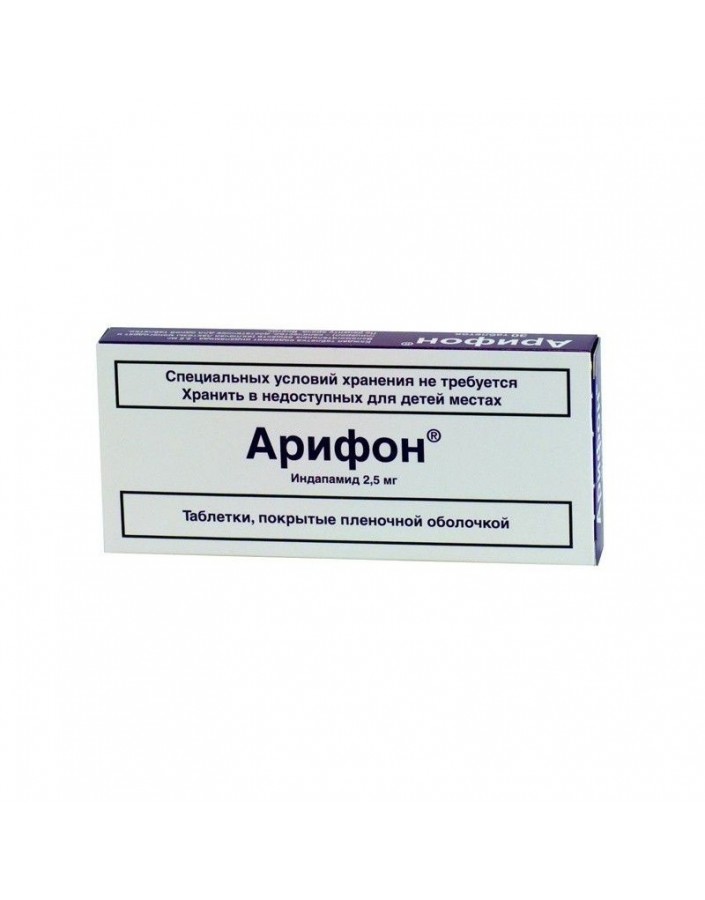




Security policy (edit with Customer reassurance module)

Delivery policy (edit with Customer reassurance module)

Return policy (edit with Customer reassurance module)
Indapamide, even in very high concentrations (up to 40 mg, ie, 27 times the therapeutic dose), does not have a toxic effect.
Symptoms: water-electrolyte imbalance (hyponatremia, hypokalemia), nausea, vomiting, arterial hypotension, convulsions, dizziness, drowsiness, confusion, polyuria or oliguria resulting in anuria (due to hypovolemia) are possible.
Treatment: urgent measures aimed at removing the drug from the body: washing the gastrointestinal tract and / or the appointment of Activated carbon, followed by the restoration of normal water-electrolyte balance.
Drug interaction
Non-recommended combination of drugs
With the simultaneous use of thiazide diuretics and lithium preparations, it is possible to increase the concentration of lithium in the blood plasma, accompanied by the appearance of signs of overdose (due to a decrease in the elimination of lithium in the urine). If necessary, the appointment of this combination should monitor the concentration of lithium in the blood plasma.
With the simultaneous use of diuretics with astemizole, bepridilom, Erythromycin (IV), halofantrin, pentamidine, sulphoridom, terfenadine, vincamine increases the likelihood of arrhythmias of the type and pirouette and. Hypokalemia, bradycardia, or prolonged QT interval may contribute to this condition.
Combinations requiring special control
With simultaneous use with NSAIDs (for systemic use), high doses of salicylates may reduce the hypotensive effect of indapamide. With a significant loss of fluid, acute renal failure may develop (due to a sharp decrease in glomerular filtration).If necessary, the appointment of NSAIDs during therapy with Arifon Retard should compensate for the loss of water and carefully monitor kidney function.
With simultaneous use of indapamide with other drugs that can cause hypokalemia, including with amphotericin B (w / w), gluco-and mineralocorticoid (with systemic use), tetracosactide, laxatives that stimulate intestinal motility, increases the risk of hypokalemia (continuous monitoring of plasma potassium and, if necessary, appropriate treatment is required).
With simultaneous use of thiazide diuretics with GCS, tetrakozaktid for systemic use, a decrease in the hypotensive effect due to the retention of water and sodium ions under the influence of GCS is observed.
With simultaneous use with cardiac glycosides, it is possible to enhance the toxic effect of the latter (it is necessary to monitor the level of potassium in the blood plasma and ECG values).
With simultaneous use of indapamide with Baclofen there is an increase in the hypotensive effect (it is necessary to compensate for the loss of water and at the beginning of treatment carefully monitor kidney function).
With simultaneous use of indapamide and potassium-sparing diuretics (including amiloride, spironolactone, triamterene), the possibility of the development of hypokalemia or hyperkalemia, especially in patients with diabetes mellitus and renal insufficiency, cannot be completely ruled out.In such cases, the level of potassium in the blood plasma, ECG parameters should be monitored and, if necessary, therapy should be adjusted.
With simultaneous use of indapamide with ACE inhibitors, hyponatremia in patients receiving ACE inhibitors, increases the risk of sudden arterial hypotension and / or acute renal failure (especially with renal artery stenosis). Patients with essential arterial hypertension and a reduced content of sodium ions in the blood plasma due to the intake of diuretics need 3 days before the start of treatment with ACE inhibitors to stop taking diuretics. In the future, if necessary, receive diuretics resume. In addition, prescribe low, gradually increasing doses of ACE inhibitors. In chronic heart failure, treatment should begin with low doses of ACE inhibitors, after reducing the dose of diuretics. In all cases, in the first week of taking ACE inhibitors, it is necessary to monitor kidney function (creatinine content in the blood plasma).
With the simultaneous appointment of indapamide and antiarrhythmic drugs that can cause arrhythmia type and "pirouette and" (including quinidine, hydroquinidine, disopyramide, Amiodarone, bretilium, sotalol) QT interval). If necessary, the appointment of this combination should monitor the level of potassium in the blood plasma and the QT interval, adjusting the dosage regimen.
With the simultaneous use of diuretics and Metformin, the appearance of lactic acidosis is possible, which is associated, apparently, with the development of functional renal failure caused by the action of diuretics (to a greater degree and "loopback"). It is not recommended to use metformin in combination with Arifon retard when the creatinine level is more than 1.5 mg / dl (135 μmol / l) in men and 1.2 mg / dl (110 μmol / l) in women.
When using iodine-containing radiopaque drugs, it should be borne in mind that the diuretic effect of indapamide increases the risk of developing renal failure. This risk is especially high when using iodine-containing radiopaque substances in high doses. Before using iodine-containing radiopaque substances, patients need to restore fluid loss.
With simultaneous use of indapamide and tricyclic antidepressants such as imipramine, there is an increase in the hypotensive effect and an increased risk of developing orthostatic hypotension.
With the simultaneous use of thiazide diuretics and calcium salts, hypercalcemia may develop due to a decrease in the excretion of calcium ions in the urine.
With simultaneous use of indapamide and cyclosporine may increase the content of creatinine in the blood plasma, which is observed even with the normal content of water and sodium ions.
Storage conditions
The drug should be stored at a temperature not higher than 30 ° C.
Arifon